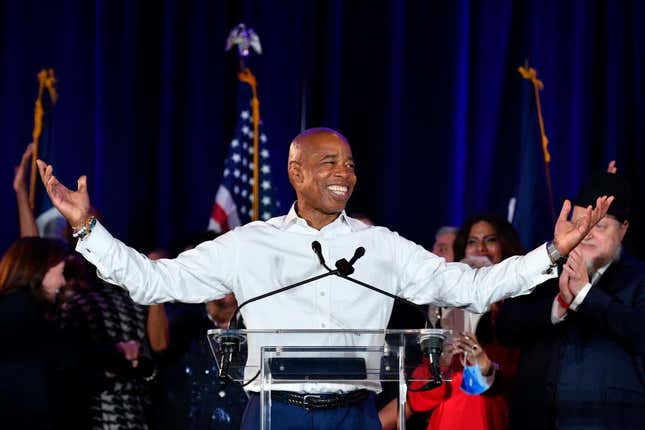
It hasn’t been a whole week into his tenure, but New York City Mayor Eric Adams loves himself a soundbite. Whether it be declaring that swagger is back in the city and fights over solitary confinement, four days may feel like a lifetime. Right now, he has directed his focus on remote working and “my low-skilled workers.”
Because of the Omicron surge, many larger businesses have pushed back their in-office plans due to increased cases and hospitalizations. Adams says to keep the “ecosystem of the city going,” larger companies should return to in-person work for a couple of days a week to support smaller businesses according to Newsweek:
“That accountant—I need him to go to the cleaners. I need him to go down to Dunkin’ Donuts. I need him to go to the restaurant. I need him to bring in the business traveling,” Adams said. “And if we say that, ‘Well I don’t have to go in. I’m still getting my salary,’ then you are not helping those New Yorkers who need us to come in.”
Why can’t the accountant learn to make his coffee until the surge of cases goes down? He’s an accountant– I’m sure he has a coffee maker or Keurig. Hell, most of us learned to make bread during 2020, so it can be done. Adams then used an abysmal choice of words when describing small businesses.
“My low-skilled workers, my cooks, my dishwashers, my messengers, my shoe-shine people, those who work at Dunkin’ Donuts—they don’t have the academic skills to sit in the corner office,” he said.
First off, New York’s unemployment rate is around 9%, double the national rate. It is 6.6% in New York City alone. I’m sure if people could work in their chosen fields, they would. People are trying to afford the bounce back in rent prices while nobody raises the minimum wage.
Secondly, there are people who work in corner offices who aren’t as skilled as people in customer-facing jobs. And many would argue that they are politicians. We have to stop this class system separation just because some people were afforded the opportunity to get a degree. Cooks, messengers, workers at Dunkin Donuts, and especially people who would have to work two or three of these jobs simultaneously are some of the most skilled people you’ll meet. Not to mention, most of this workforce is comprised of people of color.
We referred to these workers as essential when the pandemic began because we realized, “oh word, I can’t get groceries or my hair cut without these people.” Some people got tired walking around with patches of hair missing and threw their barber/hair dressed an extra tip. Many of these workers have to face getting the virus directly daily, deal with rude and inconsiderate patrons, and not get a bump in hazard pay.
But now, they are back to being referred to as “low skilled,” even though they are so integral to America’s operations not falling apart. Even so much that CDC guidance shortened the quarantine period to five days because the economy needs to keep going. They are deemed essential when we realize we can’t get our Amazon Prime packages without them, but “low skilled” when comparing paychecks.
So, if we send everybody back to offices with record-high cases, wouldn’t that make the problem worse for small businesses? What a way to thank our already taxed medical personnel who are currently dealing with 10,000 hospitalizations as of today.
Yes, small businesses are needed in every sense of the word, but what’s the use when most people can’t go to work because they get infected? Or better yet, get infected and have some form of long COVID symptom because we know America’s illustrious health care system will help get them back on their feet. This type of mentality fuels a phenomenon called “The Great Resignation,” where millions of people have realized that most jobs look at them as a number. So, they are leaving industries in droves to find better because they deserve so.
Many of us worked jobs at Dunkin Donuts while in school or at home for the summer. I value every single one of those jobs because they kept me going and carry a sense of humility every time I get to write an article.
The current Omicron surge is real, no matter the amount of swagger you want to present it. You can’t will it away or intimidate it. You can help get people back into the office is to increasing things like testing and mitigation measures. Or accept that the culture of work itself has changed. If you’re concerned about people being behind on rent, you could urge Washington to get the $1 billion in relief funds out. Just falling into the hands of capitalism will result in more sickness, deaths, and a lot of fallout for the businesses you’re trying to protect.

